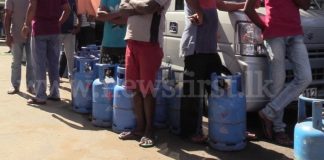lanka
Catholic Priest Destroyed the Entire Mayan Written Language
Gas distributed amidst police protection as shortage takes its toll
The lion’s fairy tale
Sri Lanka’s Laugfs says unable to import cooking gas due to...
ECONOMYNEXT – Laugfs Gas, Sri Lanka’s privately owned cooking gas company is unable to import liquid petroleum (LP) gas due to a lack of dollars in the market making it difficult for the company to open letters of credit (LCs) with its banks, the company’s chairman said on Monday (03).
“We are talking to all the banks, even Samurdhi banks, to see if they can give us dollars,” Laugfs Chairman W K Wegapitya told EconomyNext.
“Sri Lanka’s commercial banks and state-owned banks must organise dollars. It’s not just for us; it’s the same for importers of cement, milk powder and many others.”
“In the simplest terms any country should have foreign reserves to import products. Sri Lanka doesn’t print dollars; we print only rupees.”
Wegapitya told reporters earlier Monday morning that his company has the infrastructure to supply cooking gas to Sri Lanka within two weeks if the LCs could be be duly opened.
He said that the company was supplying around 40,000 to 50,000 gas cylinders per day but now it’s only able to distribute around 10,000 to 15,000 cylinders after the Consumers Affairs Authority (CAA) and Sri Lanka’s Standards Institution (SLSI) increased the requirement of quality checks for gas distributors after a spate of domestic gas cylinder explosions.
Laughs Gas controls around 20 percent of the LP gas market in Sri Lanka while the state owned Litro Gas Lanka Ltd supplies 80 percent.
Litro said yesterday that the company will take at least three weeks to supply gas to reach normal market levels due to tightened safety regulations for gas distributors.
The distribution delay has already led to a black market for LP gas. A 12.5 kg cylinder, which is officially priced at 2,750 rupees, is being sold around 4,500 rupees in some places, local media reported. (Colombo/Jan03/2022)
If reserves increased, why not issue dollars? – MP Dr Harsha...
Sri Lanka’s Litro gas to add 180,000 cooking gas cylinders to...
ECONOMYNEXT – Litro, Sri Lanka’s state owned liquid petroleum gas company currently embroiled in a controversy surrounding domestic gas cylinder-related explosions, said it will release 180,000 cylinders to the market in the next few weeks as demand for cooking gas increases in the market.
“Due to the high levels of demand for Litro gas, the company hopes to release 180,000 cylinders to the market, and its daily filling and distribution activities will take place 24 hours a day,” Chamani Pathirage, a spokesperson for Litro Gas Lanka Ltd said.
The company assured consumers that there will be no further shortage of gas cylinders in the market as it is taking measures to avoid future interruptions to the supply.
“We are trying to import machinery to improve quality and to speed up the manufacturing process to cover the time spent at the filling stations due to quality control of canisters,” Pathirage added.
More than 800 cooking gas explosions have been recorded in Sri Lanka since October 2021.
Last week a presidential committee concluded that most of the gas explosions were due to composition change in LPG.
“The cylinders, regulators, stoves, and other equipment have remained unchanged. What was subjected to change was the gas composition,” Prof Shantha Walpolage, the head of the committee appointed by President Gotabaya Rajapaksa, told reporters on December 22.
In April, Litro introduced a hybrid gas with a 50:50 (Butane and Propane) composition different to the historically used 70:30.
As a short term solution, the expert proposed that the propane content in the gas cylinder be reduced to 30 percent while adding more ethyl mercaptan, a pungent-smelling chemical compound used as an additive for consumers to detect any leaks, to the mix.
The Court of Appeal earlier this month ordered that both Litro and Laugfs maintain a mix of 70 percent butane and 30 percent propane in the LP gas cylinders they sell, following the revelation.
Experts have hypothesised that increasing the propane content of the cylinder to 50 percent had resulted in high pressure which had led to leaks from the cylinder. However, this has yet to be proven scientifically. (Colombo/Dec30/2021)
2021 recapped
ECONOMYNEXT – Though the prospects for the New Year are bleak to say the least, many in Sri Lanka will be eager to see the back of 2021, one of the longest – and yet, somehow, shortest – years in living memory. So much happened over the last 365 days with such unnerving frequency that there is no telling what else might be in store for the country before the clock strikes 12 Friday night.
From the devastation caused by COVID-19 and other natural and manmade calamities to the crippling forex shortage and the existential threat posed by cooking gas, of all things, the past year was a rollercoaster ride through hell and not-quite back, with the harness taken off.
Having taken over 14,000 lives despite impressive strides in vaccination, the pandemic caused havoc on the economy, compounded by a series of bad decisions, each worse than the last. 2021 also saw one of the biggest agriculture policy blunders in Sri Lanka’s history, with whispers of a food crisis portending worse times ahead.
Now, as the year comes to a close with the economy in near tatters and uncertainty looms over the horizon, the island nation of 22 million await with a mix of trepidation and cautious optimism a future that could really go either way.
Yet, in spite of it all, we at EconomyNext would like to wish our readers a happy New Year, as we look back at the one we’re about to leave behind.
January
The first month of 2021 saw Sri Lanka bringing in over 1,400 tourists from Ukraine at a time when daily COVID-19 cases were said to be on the rise in that country.
Sri Lankans banned from Polonnaruwa, Sigiriya when Ukrainians visit
On January 12, actor-politician Ranjan Ramanayake, a Member of Parliament for the main Opposition Samagi Jana Balavegaya (SJB), was sentenced to a four-year rigorous imprisonment for contempt of court by the Supreme Court. Ramanayake was charged for making disparaging remarks about the judiciary at a press conference held in 2017.
Actor-politico Ranjan Ramanayake jailed for contempt
Sri Lanka started its COVID-19 vaccination on January29, with frontline workers at Colombo Army Hospital and the Infectious Diseases Hospital (IDH) receiving their first Covieshield jab.
Sri Lanka begins vaccination of frontline workers
February
On February 07, thousands of Sri Lanka’s Tamils and Muslims embarked on a massive, five-day march from Pothuvil in the Eastern Province through Mannar to Polikandi in the northern peninsula. Organisers said the March, known was P2P, was a “huge success”. Meanwhile, Tamil National Alliance (TNA) MP M A Sumanthiran, who attended a P2P railly, claimed that the STF guards assigned to protect him had been withdrawn consequent to his P2P participation.
Sumanthiran says Minister Weerasekara is responsible if he is harmed
On February 23, Pakistan Prime Minister Imran Khan who was on an official two-day visit to Sri Lanka was welcomed by Prime Minister Mahinda Rajapaksa at the Bandaranaike International Airport (BIA). Khan was the first head of government to visit Sri Lanka since President Gotabaya Rajapaksa assumed office in November 2019.
Pakistan PM Imran Khan arrives in Sri Lanka for two-day visit
Sri Lanka finally issued a gazette notice ending the forced cremation of Muslim and Christian COVID-19 victims, a practice that critics said was cruel and went against global health practices. Some Buddhist monks and nationalist elements had opposed the burial of Muslim victims claiming it would contaminate the water table – a claim that was not backed by science.
Sri Lanka allows burial of Muslim and Christian Covid-19 victims by gazette
March
A 33-year-old Sri Lankan student died in an immigration detention centre in Japan after Japanese authorities refused to provide her much needed medical care or food.
On February 17, the Attorney General ordered the Police Department to produce detained lawyer Hejaaz Hizbullah before a Magistrate’s Court on charges filed under the Prevention of Terrorism Act and the International Covenant on Civil and Political Rights. The announcement also said that the Inspector General of Police has been directed to produce a Principal of a Madrassa school Mohamed Shakeel before a Magistrate under the same charges. Shakeel was also remanded until March 3.
Hisbullah and one other remanded for alleged role in Easter Bomb attacks
Former Finance Minister Ravi Karunanayake and seven others were remanded by the Special High Court hearing the alleged Central Bank Bonds scam until Monday March 23. Those remanded include Arjun Aloysius the former head of Perpetual Treasuries which has been accused of the scam as well as several officials in the Central Bank as well as the trader.
RaviK, Aloysius and five others remanded over alleged Bonds Scam
A bus plunged down a precipice in Passara killing 14 and injuring 31 others on March 20. The bus was travelling from Lunugala to Colombo and plunged about 200 feet near the 13th milepost on the Badulla-Moneragala road.
RDA investigating deadly bus accident site
On March 23, Sri Lanka lost a vote at the United Nations Human Rights Council (UNHRC) as the 47 member states voted 22 to 11 to impose a resolution that would empower the UN to collect and store information that could lead to international criminal proceedings.
Sri Lanka loses vote at UN Human Rights Council
The Colombo magistrate court acquitted Minister Johnston Fernando on March 26 from two cases.
April
Former Finance Minister Ravi Karunanayake and six others who had been remanded over the alleged March 2016 bond scam were released on bail on April 01. The suspects were remanded on March 17 over alleged links to the misappropriation of Rs 15 billion through the March 31 2016 bond auction.
Bond scam: Ravi, six others released on bail
All eyes were on Sri Lanka on April 21 when a high-profile beauty pageant for Sri Lanka’s married women ended in disaster as the winner was unceremoniously de-crowned by her predecessor in front of a live audience. The “Mrs. Sri Lanka 2021” contest at the Nelum Pokuna Mahinda Rajapaksa theatre became a farce after the declared winner, Pushpika de Silva, was forced out within minutes by her immediate predecessor Caroline Jurie.
Sri Lanka’s brawling beauties end up at the police station
In what would prove to be a highly controversial decision, Sri Lanka on the last day of April announced a decision to ban the import and use of “chemical” fertilizer, insecticide and weedicide.
Sri Lanka to ban import, use of fertilizer, agro-chemicals to save foreign exchange
May
Sri Lanka decided to close down all schools, preschools and piriven (monastic schools) in the island to contain the spread of COVID-19.
Sri Lanka closes all schools amid pandemic resurgence
Singapore flagged container vessel X-press Pearl, anchored off Colombo port, caught fire on May 20, leading to the worst marine environment disaster.
Singapore flagged X-Press Pearl under watch off Sri Lanka after fire
Speaker Mahinda Yapa Abeywardena placed his signature on Sri Lanka’s China-backed Colombo Port City Economic Commission Bill on May 27. The controversial bill was passed in parliament on May 20 subject to amendments following a Supreme Court decision, amid protest from opposition parties, activists and members of the clergy.
Sri Lanka speaker signs off on controversial Port City economic commission bill
June
X-Press Pearl, the container vessel that caught fire while carrying hundreds of tonnes of caustic soda and a leaking acid container continued to sink into shallows off Sri Lanka’s Colombo Port.
X-Press Pearl which carried caustic soda sinks slowly off Sri Lanka, no oil spill yet
Former Criminal Investigation Department (CID) chief Shani Abeysekara ws released on bail on June 16 following 10 months in custody. The Court of Appeal slammed Sri Lanka Police for using “concocted stories” to incarcerate their own top detective whose detention sparked a censure motion against Sri Lanka at the European parliament.
Appeal court slams Sri Lanka police for framing top detective
Former Sri Lanka MP Duminda Silva who was serving a death sentence over murder charges was released from prison on June 24 on a “special presidential pardon”. Silva was released June 24 morning in addition to 93 prisoners including 16 ex-Tamil Tiger combatants who were also pardoned by the president.
Former Sri Lanka MP and murder convinct Duminda Silva out on presidential pardon
July
On July 08, Sri Lanka police arrested over 45 people including Sri Lanka Teachers’ Union General Secretary Joseph Stalin for engaging and demonstrations and protests in violation of a COVID-19 ban on protests and public meetings. The protest was held against the proposed Kotelawala Defence University (KDU) bill at the parliament roundabout in Sri Jayawardenapura, Kotte.
Sri Lanka police arrest over 45 for organising protests in violation of ban
Close on the heels of his appointment as a national list MP, Sri Lanka Podujana Peramuna (SLPP) architect and campaigner Bail Rajapaksa was sworn in as Minister of Finance on July 08. Rajapaksa had long been speculated to enter the house on the national list, with backbencher MPs of the government going on record that he would’ve prevented the recent fuel price hike, among other issues.
Enter Basil: Reshuffles, fireworks, frog marches mark arrival of Sri Lanka’s new finance minister
On July 12, Teachers’ and Principals’ Trade Unions withdraw from all online classes, in protest of the arrest and “forced quarantine” of activists and union leader Joseph Stalin.
Forced quarantine of protestors: Teachers’ unions in Sri Lanka refuse to teach online
Sri Lanka’s government defeated a no confidence motion against its energy minister Tuesday (20), with 61 voting in favor of the motion and 152 against.
No faith motion against Sri Lanka energy minister defeated
Amid hearty greetings from government benches and a more lukewarm welcome from the opposition, Sri Lanka’s four-time Prime Minister Ranil Wickremesinghe was sworn in as a member of parliament on June 23 for a record ninth consecutive time.
Sri Lanka former PM Wickremesinghe back in p’ment; receives warm welcome from govt MPs
Police said a postmortem has revealed evidence of “chronic vaginal penetration” of a 16-year-old domestic aide at former Sri Lanka minister Rishad Bathuideen’s private residence who succumbed to burn injuries on July 15.
Death of former Sri Lanka MP’s 16-y-o maid: Postmortem reveals vaginal penetration
August
As COVID-19 cases raged and experts all but begged for movement restrictions, Sri Lanka on August 20 announced a 10-day lockdown. Moments before the announcement was made, State Minister Channa Jayasumana told reporters that President Gotabaya Rajapaksa had agreed to a request by the country’s Buddhist prelates to shut down the country for one week to contain a rising wave of delta variant-led COVID-19 infections.
Sri Lanka to go into 10-day lockdown as COVID-19 surges
Sri Lanka’s former finance minister Mangala Samaraweera passed away on August 24 in a private hospital where he was being treated for COVID-19. The 65-year-old politician contracted the virus earlier that month and was receiving intensive care unit (ICU) treatment at the Lanka Hospital, despite being fully vaccinated.
Sri Lanka former finance minister Mangala Samaraweera passes away
In a day of firsts for Sri Lanka, Dulan Kodithuwakku won the bronze medal for javelin throw in the F64 category Monday (30) at the Paralympics, hours after Dinesh Priyantha Herath won gold and set a new world record in javelin throw in the F46 category. This is the first time Sri Lanka won double medals in the same event in the same year.
Sri Lanka wins second Paralympics medal in one day for javelin throw
September
Sri Lankan pop icon Sunil Perera whose music inspired generations passed away in the early hours of September 06. The 68-year-old singer and musician had tested positive for COVID-19 in August and had to be admitted to the intensive care unit (ICU) of a private hospital. He was then discharged having apparently recovered, only to be re-admitted a week before his death.
Sri Lankan pop icon Sunil Perera passes away; tributes pour in
Sri Lanka extended its COVID-19 lockdown to September 21, after pleas from various quarters including State Minister of COVID Control Dr Sudarshini Fernadopulle. The lockdown was imposed on August 20 after a surge in cases and deaths attributed to the delta variant of SARS-CoV-2, the virus that
Sri Lanka extends COVID-19 lockdown to September 21causes COVID-19.
On September 13, the United Nations Human Rights chief raised concerns over Sri Lanka’s conduct over addressing past alleged human rights violations and said the world body will initiate maximum information gathering this year over said violations.
UN rights boss unhappy over Sri Lanka’s attempts at addressing alleged abuses
Former State Minister of Money and Capital Markets Nivard Cabraal who resigned from parliament was appointed Governor of Sri Lanka’s central bank with effect from September 15, a post he had held until 2014. “I will be concentrating on stability first and growth,” Cabraal said upon taking up the position.
Nivard Cabraal says will focus on “stability first” as Sri Lanka CB Governor
On September 15, Sri Lanka’s Prison Management State Minister Lohan Ratwatte tendered his resignation from the portfolio over an incident alleged to have occurred in the Anuradhapura prison. In a letter addressed to President Gotabaya Rajapaksa, Ratwatte – short of accepting responsibility or apologising for the alleged incident – requested the acceptance of his resignation as State Minister of Prison Management and Prisoners’ Rehabilitation.
Sri Lanka prisons minister resigns after opposition MPs demand removal, legal action
US-based New Fortress Energy Inc said on September 22 that it had struck a deal with the Government of Sri Lanka to supply 1.2 million gallons of liquefied natural gas to supply a plant it is planning to buy a stake in and others.
US based New Fortress Energy says strikes LNG supply deal with Sri Lanka
October
Sri Lanka relaxed its six-week COVID-19 lockdown, or ‘quarantine curfew’ as it was officially known, at the start of the month, though some restrictions such as an inter-provincial travel ban remained.
Sri Lanka relaxes six-week COVID-19 “lockdown”, but some restrictions remain
Indian conglomerate the Adani Group, Sri Lanka’s John Keells Holdings and the Sri Lanka Ports Authority (SLPA) signed an agreement to jointly develop the Colombo West International Container Terminal (CWICT) of the Port of Colombo (POC). Diplomatic relations between India and Sri Lanka had been strained since the latter unilaterally cancelled a 500 million US dollar tripartite East Container Terminal (ECT) deal in February this year citing trade union pressure.
India Foreign Secy invites Sri Lanka to mutually deepen “time-tested” ties
Two relatives of Sri Lanka President Gotabaya Rajapaksa and Prime Minister Mahinda Rajapaksa were named in the so called Pandora papers, a global investigative journalism group-led analysis on documents related to offshore financial companies, showed. Nirupama Rajapaksa, the cousin of both Sri Lanka’s president and Prime Minister, and her husband Thirukumar Nadesan were named in the leaked docuents that were investigated by the International Consortium of Investigative Journalists (ICIJ) in collaboration with the BBC, the Washington Post, the Guardian, WDR/NDR (Germany) and others.
Members of Sri Lanka president, PM ruling family in Pandora papers
In a historic first for Sri Lanka, three female Senior Superintendents of Police (SSP) were promoted to the rank of Deputy Inspector General (DIG) on October 07.
Three women SSPs promoted to DIG in historic first for Sri Lanka Police
The Attorney General’s Department on October 13 informed Sri Lanka’s Court of Appeal that charges against former Navy Commander Wasantha Karannagoda over the alleged disappearance of 11 youth in 2008 would not be taken forward.
An alliance of school teacher and principal trade unions in Sri Lanka who had been on strike for over three months demanding higher pay said they would resume duties next week (25) but will continue to agitate and refrain from non-academic work.
Sri Lanka’s school teachers to return to work on Oct 25 but TU campaign to continue
President Gotabaya Rajapaksa appointed controversial monk Galabodaaththe Gnanasara thero to lead a 13-member task force on ‘One Country, One Law’ to come up with proposals to implement one law for all Sri Lankans abolishing all other personal laws including Muslim marriage law and some other regional laws that had existed for centuries in Sri Lanka.
BBS proposals will make it to ‘one country, one law’ task force: Sri Lanka hardline monk
November
Twenty-six people were killed and over 12,000 were forced into relief camps in adverse weather in Sri Lanka. The Disaster Management Centre (DMC) said 150 secretariat divisions in 17 districts were affected by floods, heavy rainfall and landslides.
Rains subside in Sri Lanka, but death toll rises to 26; 12,000 still stranded
Sri Lanka’s COVID-19 death toll passed 14,000 in November.
Sri Lanka Covid-19 total tops 14,000, Coronavirus isolation for Kandana, Mahabage
Sri Lanka’s main opposition the Samagi Jana Balavegaya (SJB) cried foul at alleged government attempts to block its protest marches on November 16, with the police having turned away many protestors and promising to act if the party went ahead with a mass rally scheduled for later that afternoon in Colombo.
Sri Lanka opposition protests: crowds gather as police promises to act
Sri Lanka’s parliament passed a budget for 2022 with 153 votes for and 60 against in its second reading at the 225-member assembly.
Sri Lanka parliament passes 2022 budget with 153 votes
Six Sri Lankans including four children drowned when a ferry capsized in Kinniya, Trincomalee, November 23 morning, leading to angry protests from locals over an unfinished bridge that they claimed had to the tragedy.
Angry residents burn tires in protest following ferry tragedy in Sri Lanka
On November 24, President Gotabaya Rajapaksa opened Sri Lanka’s first cable-stayed six-lane bridge constructed with a concessionary loan of 35,020 million yen from the Japan International Cooperation Agency (JAICA).
Sri Lanka opens Japan-funded ‘Golden Gate Kalyani’ bridge
Sri Lanka finally ended a ban on the import of chemical fertilizer and agro-chemicals on November 24. “From today chemical fertilizer, fungicides pesticides, and weedicide imports are allowed,” Minister Aluthgamage said.
Sri Lanka ends fertilizer ban, private sector imports allowed
December
The last month of the year began with the Board of Investment of Sri Lanka, the state investment promotion agency, being hit by resignations of several board members and senior officials. Board members Harsha Cabraal PC, Sanjay Kulathunga and Harsha Subasinghe as well as Chairman Sanjaya Mohottala and Director General Pasan Wanigasekara have tendered their resignations.
Sri Lanka’s Board of Investment hit by multiple resignations
A Sri Lankan national was burnt alive in Sialkot, Pakistan, by a lynch mob over allegations of blasphemy. The circumstances of the alleged blasphemy are said to be suspect and investigations are still ongoing.
Sri Lanka condemns lynching of national in Pakistan
Sri Lanka was hit by a cascading power failure shortly after 1130hours on December 03, with the grid down around the island. The blackout was suspected to have been triggered by the failure of a 220kV transmission line that brings power from the Mahaweli hydro-generation system running from Kotmale to Biyagama in the capital Colombo.
Sri Lanka power blackout as grid hit by cascading failure
A wave of cooking gas explosions, fires and related incidents shake Sri Lankans already battling multiple crises across various fronts.
Sri Lanka’s mysterious gas explosions become nobody’s baby
A communiqué issued by Sri Lanka’s ministry of health pointed to a decision reinstate Dr Shafi Sihabdeen of the Kurunegla Teaching Hospital who was sent on compulsory leave over unproven allegations of forced sterilisation. Subsequent reports contrary to this claim have led to much confusion over the development.
Sri Lanka doctor accused of forced sterilisation reinstated
On December 19, senior government ministers defended a decision to pay 6.7 million US dollars to a Chinese fertilizer company over a deal that had gone awry, as opposition lawmakers decried the move. Sri Lanka’s cabinet of ministers has decided to pay the 6.7 million dollars to the China’s Qingdao Seawin Biotech Group Co Ltd, whose organic fertilizer was rejected by the island nation.
Sri Lanka ministers defends decision to pay millions to Chinese fertilizer company
On December 13, Sri Lanka President Gotabaya Rajapaksa prorogued parliament till January 18, 2022, according to a gazette notice. Parliament was earlier expected to meet on January 11. The action, among others automatically dissolves parliamentary committees including the Committee on Public Enterprises, political analysts said. The COPE had recently questioned the Board of Investment officials leading to the resignation of its chairman and several other officials.
Sri Lanka President prorogues parliament
Sri Lanka’s nation-wide inflation measured by the National Consume Price Index accelerated to 11.1 percent in November 2021 up from 8.3 percent, after record money printing to maintain low interest rates, despite a surging budget deficit.
Sri Lanka national inflation hits 11.1-pct in November 2021 after money printing
On December 11, Sri Lanka’s state-run Ceylon Petroleum Corporation (CPC) hiked petrol by 20 rupees to 177 rupees a litre and auto diesel by 10 rupees to 121 rupees, as money printing depreciated the rupee and global commodity prices also went up due to Federal Reserve loose policy.
Sri Lanka hikes petrol to Rs177, diesel Rs121 a litre
Sri Lanka’s foreign reserves had reached 3.1 billion US dollars by December 29, Central Bank Governor Nivard Cabraal said on December 29. Official foreign reserves had dropped to 1587 million US dollars in November, amid continued liquidity injections mainly made to sterilize interventions.
Sri Lanka foreign reserves reach US$3.1bn by Dec 29: CB Governor
Amid reports that cash-strapped Sri Lanka’s ruling coalition is split down the middle over an International Monetary Fund (IMF) bailout, another cabinet minister on December 29 spoke in favour of IMF assistance, even going as far as to hint at the sale of the country’s national carrier.
Sri Lanka minister wants IMF bailout, hints at letting national carrier go
(Colombo/Dec31/2021)









